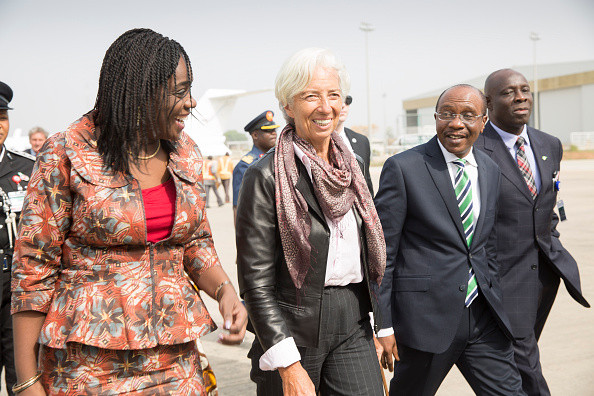IMF director Christine Lagarde visits Nigeria amid ongoing economic crisis

The managing director of the International Monetary Fund (IMF) has arrived in Nigeria on an official visit to the country. Christine Lagarde is expected to hold meetings with leaders, stakeholders and policy makers in Nigeria and Cameroon between 4 and 9 January.
Lagarde was welcomed by the minister of finance Kemi Adeosun and governor of the Central Bank of Nigeria (CBN) Godwin Emefiele at the Nnamdi Azikiwe International Airport in the federal capital of Abuja on 4 January.
The aim of Lagarde's visit is to strengthen relations between the IMF and its African member countries, as well as reinforcing the partnership with Nigeria, Africa's largest economy.
"I look forward to productive meetings with President [Muhammadu] Buhari and his colleagues as they address important economic challenges, most importantly the impact of low oil prices," Lagarde said before the trip.
In Cameroon, Lagarde is to meet President Paul Biya and his economic team. She will also hold meetings with the finance ministers of the Economic and Monetary Community of Central Africa (Cemac).
She said: "As the largest and most diversified economy in Cemac, Cameroon is well-placed to sustain, and reinforce, the momentum of integration."
Lagarde's visit came days after Buhari announced the 2016 budget, in which he announced Nigeria will increase domestic borrowing to N984bn (£3.3bn, $4.9bn) and foreign borrowing to N900bn, totalling N1.84tn.
Buhari forecast the country would face a N2.22tn deficit, amid an ongoing fuel crisis and decreasing oil prices. Price per barrel is now around $36 to $38 compared to $50 at the beginning of 2015.
Nigeria is Africa's biggest oil producer and petroleum exports make up 90% of the country's total revenue.
However, the nation's lack of refineries – at present there are four and of these, three resumed production in July after months of inactivity – mean the country has to export about 90% of its crude oil and import petroleum products, including fuel.
The government then sells fuel to Nigerians at subsidised prices and reimburses the difference to importers. The previous administration, led by Goodluck Jonathan, has been blamed for the ongoing fuel shortage, amid the outrage of many.
Terrorism affecting investments
Potential investments in Nigeria have been negatively impacted by the ongoing insurgency of terror group Boko Haram, which has killed thousands of people in north east Nigeria and neighbouring countries since 2009.
Who are Nigeria's Boko Haram terrorists?
Boko Haram (renamed Iswap) fights against Western influence in Nigeria and aims to impose its version of Sharia law throughout occupied territories. The group declared an Islamic caliphate in Gwoza, along the Cameroon border, in August 2014.
Boko Haram carries out attacks in Nigeria and neighbouring countries in a bid to take control of more territory. Three Nigerian states − Adamawa, Borno and Yobe − have been under a state of emergency since May 2013.
Boko Haram has killed between 17,000 and 20,000 people since 2009 and was deemed the world's deadliest terror group, surpassing its ally the Islamic State (Isis), in November. Nigeria has become the world's third most terrorised countryas a result of the group's violent insurgency.
According to the World Investment Report (WIR) 2013, foreign investments in Nigeria dropped by 21%, from $8.9bn in 2011 to $7bn in 2012. The following year, foreign investments in the African nation were less than $6bn. In 2014, investment inflow dropped by 16% to $4.7bn.
In 2015, Buhari instructed the military to defeat the terrorists by December. Although several analysts said more time was needed to eradicate the terrorists, the government announced a "techinal victory" over the group.
However, subsequent attacks blamed on Boko Haram left dozens dead in Maiduguiri and Adamawa state at the end of December.
The Nigerian army is leading a regional offensive – consisting of 8,700 troops from Nigeria, Niger, Chad, Cameroon and Benin – against Boko Haram, which pledged alliance to Islamic State (Isis) in March 2915.
The offensive has scored some successes, such as the recapture of key territories and the recovery of arms and vehicles used by the terrorists during their attacks in the country's north east and neighbouring nations.
© Copyright IBTimes 2025. All rights reserved.






















